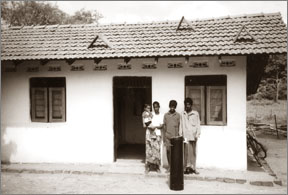|
observer |
|
|
|
|
|
OTHER LINKS |

|

|

|
The guts and toil of the northernmost Sinhalese farmerKatukeliyawa, one of the most distant Sinhalese settlements in the north central province of the island of Sri Lanka is so sparsely populated, it looks like a setting on the hinterland of a continent.
Houses, here, could be miles away, which makes it a hapless situation for the peasant. For, while it is desirable that the land/man ratio be tipped in man's favour, such human luxury does not augur well for the protection of human beings living in these surroundings of forest cover. It is not just that closeness or social living will help ward off the elephant which often kills man, here. The problem is much graver, being the heightening attacks of LTTE terrorists on civilians and home guards in these northern peripheries. These attacks are in retaliation to the Sri Lanka army, now beating back the LTTE in the east of the island. Such operations, at much economic cost to the nation, benefits Tamil civilians, living under a fanatical yoke. Farmer, S Gamini 42, his wife, S Ranmanika, their daughter Kumudu Mala (who was shy to face the camera), her daughter Thirindu Mala Sanka two-and-a-half-years old, and Gamini and Ranmanika's son Senaka Erantha 13, lived in a straw thatched house. When it rained, the house got wet. The Karuna Trust built the house in the picture, a few months ago. It cost 300,000 rupees (109 rupees to a US dollar) because of community participation, being how, peasant homes are built in rural Sri Lanka. Even the bricks were turned out by the villagers, they said. Philanthropist Mahinda Karuneratne 74 has built ten such houses in the peripheries of Madawatchchiya. The objective of the Karuna Trust is to persuade the Sinhalese to hold on to their land, instead of running away, further south and handing over more territory to the norther terrorists. Marriage is early, where men live off the soil and academic skills are difficult to acquire. In such a setting, Kumudu Mala's husband turned home guard two months ago, to hold fluid cash in his hand. He is posted in Vavuniya, nearby. While others said that home guards earn a monthly salary of Rs. 14,500, Mala said that her husband is expected to receive Rs 10,500 per month, and has yet not received a pay packet. Perhaps, he is undergoing training. The family has a quarter acre of paddy land. This area is part of the island's dry zone, and water for irrigation is obtained from an ancient man-made water-body. If there is insufficient rain for four months of rice cultivation, other crops, example, kurukkan and chilies are grown. Women in the hinterland have no chance of securing employment; no industries are set up so far away from the towns, because of the scarce population and an unruly youth nearby. So, wife, Ranmanika continues being her husband Gamini's co-worker. When the rains do not come, the head of the family leaves home, and works for more fortunate farmers, who have access to water from larger irrigation tanks, or sell their labour in the towns or the big city. For Gamini, it is venturing to Anuradhapura, where irrigation tanks are found. What will happen with the passing of generations and the land gets divided? No one knew, for the only occupation they could think of, was living off the soil. Son, Senaka Erantha attends Periyakuluma school, ten miles away, being Madawatchchiya which is the closest town. Senaka could not comprehend that when he grows up, he could take up a skilled profession as a carpenter or mason, not to speak of becoming a storekeeper or clerk. For these regions are so underdeveloped, such thoughts do not enter the heads of children, or even the mind of their simple parents. The culture of ancient Sri Lanka, thrived on the the village being fed by an irrigation tank, making rice cultivation possible, and a Buddhist temple, in close proximity, so that man, lived like a decent being, respecting one another, and the fauna and flora which are inseparable members of mother nature. Now, when some of these essential human ingredients are missing, it brings to mind, what the Indian Sage, of yore said, that the doctrine cannot be preached to one who is hungry. Adding more problems of these human begins, the water in these areas are contaminated with an excess of fluoride, which in the long term leads to kidney failure. The medical profession here, say that government hospitals are packed with patients seeking help for problems of the kidneys. Gamini suffers from a kidney ailment and receives treatment at the nearest government hospital in Madawatchchiya. The Karuna Trust has gifted 100 fluoride filters which cost Rs 1,350 each, in this area. The Grama Niladhari or headman of the village was told by the divisional secretary for Madawatchchiya, Prasanna Madanayake to instruct villagers on how they should use their fluoride filter. In Gamini's house, the jet black fluoride filter lay idle. Gamini and his family said that the Grama Niladhari had not instructed them on how to de-fluorinate water, using the filter. So, the black idle fluoride filter stood in the sun (see picture) a monument to a government servant's unconcern, for simple people, he is expected to minister unto. The Karuna Trust plans to hand out 600 fluoride filters, one to each family, being Sinhalese, Tamils and Muslims, living in the boarder villages of Thammanakuluma, Periyakuluma and Katukeliyawa. |








